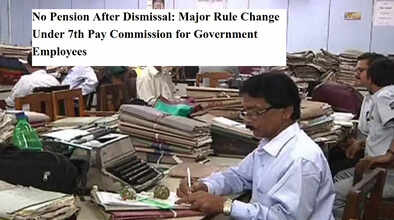No Pension After Dismissal: Major Rule Change Under 7th Pay Commission for Government Employees

New Delhi: If you are a government employee, a major update in pension policy might directly affect your post-retirement benefits. The Central Government has amended key rules, stating that any public sector employee dismissed or removed from service will no longer be eligible for pension—a move that could have widespread consequences.
This change has sparked discussions across departments and has put a renewed emphasis on integrity, transparency, and discipline in public service.
🛑 Dismissed Employees Will Lose Pension Rights
Under the new Central Civil Services (Amendment) Rules, 2025, effective May 22, 2025, the central government has officially barred pension benefits for employees who are:
-
Removed from service, or
-
Dismissed for misconduct, corruption, or negligence.
Previously, such employees were still entitled to retirement benefits and pension, but this leniency has now been withdrawn.
The key idea is: If an employee is terminated due to disciplinary action, no pension will be granted.
⚖️ Final Decision Rests with the Administrative Ministry
Although the rule is strict, the final say lies with the administrative ministry overseeing the specific department or public sector unit (PSU). In certain cases, the ministry can conduct a review and recommend relief measures, but only under special or exceptional circumstances.
This aligns the PSU regulations with the existing Central Civil Services (CCS) Pension Rules, bringing more uniformity in disciplinary pension policies.
🔁 Can Pension Be Reconsidered? Yes—Under Certain Conditions
The amended rules do allow room for review:
-
If an employee displays reformed behavior over time, the administrative ministry may reinstate pension benefits.
-
Family pension may still be granted to dependents, subject to evaluation.
-
In rare situations, humanitarian financial support may be provided as an ex gratia or monthly allowance.
👥 Who Will Be Affected by This New Rule?
This amendment only applies to government employees appointed on or before December 31, 2003, i.e., those covered under the Old Pension Scheme (OPS).
Important exclusions:
-
Railway employees
-
Daily wage workers
-
Officers from All India Services, including IAS, IPS, and Indian Forest Services (IFoS)
Employees appointed after January 1, 2004, are already under the New Pension Scheme (NPS) and hence are not covered under these amended OPS rules.
📌 Why This Matters
This policy shift is seen as an effort to curb misconduct in government departments, especially in cases of corruption, dereliction of duty, or gross negligence. It aims to send a clear message that:
Job security does not mean immunity from consequences.
For honest officers and employees, this may have little impact—but for those in questionable positions, it introduces a stronger accountability framework.
🧾 Final Takeaway
If you're a public sector employee covered under the old pension scheme, it’s essential to:
-
Understand these changes
-
Maintain a clean service record
-
Know your appeal and review rights
These rules are now in effect, and any violation of service norms could mean a retirement without pension—a scenario no government employee wants to face.

